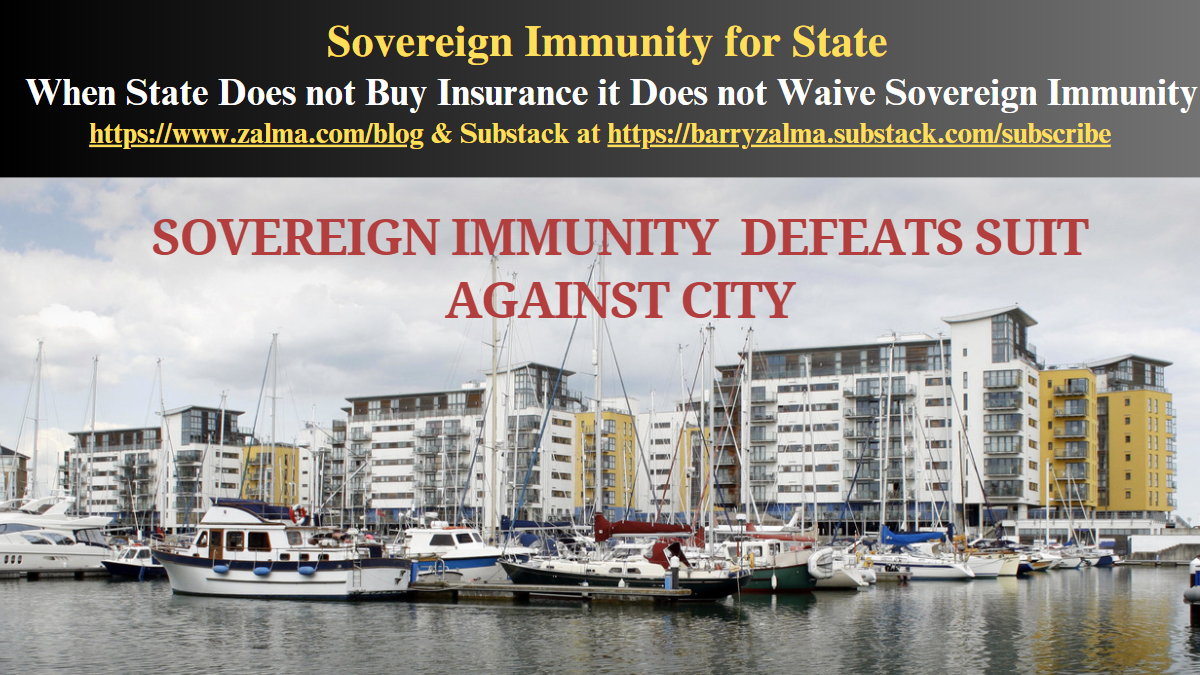-
News Feed
- EXPLORE
-
Pages
-
Groups
-
Events
-
Blogs
-
Marketplace
-
Offers
-
Jobs
-
Developers
Sovereign Immunity for State

When State Does not Buy Insurance it Does not Waive Sovereign Immunity
Post 4854
Read the full article at https://lnkd.in/g38dnGuj, see the full video at https://lnkd.in/gQsVJgXn and at https://lnkd.in/gHJ_Hij9, and https://zalma.com/blog.
Plaintiffs appealed from the trial court’s order granting summary judgment in favor of Defendant, the City of Winston-Salem (“the City”).
In Livingstone Flomeh-Mawutor, Georgina Michael Shenjere and Konsikrated Moringa Farms d/b/a More Than Manna v. City Of Winston-Salem, No. COA23-809, Court of Appeals of North Carolina (August 6, 2024) the Court of Appeals unsuccessfully sought evidence of waiver of sovereign Immunity.
BACKGROUND
In the summer of 2019, Plaintiffs applied for a $100,000 loan via the City’s small business loan program.
In August 2019, Flomeh-Mawutor allegedly received verbal confirmation from Steven Harrison, a small business development specialist for the City, that Plaintiffs’ loan request had been approved and that a written letter of approval would be sent the following week. Plaintiffs allege that “Harrison was . . . in routine communication” with Plaintiffs over the ensuing months and repeatedly promised that the loan would close soon.
The loan eventually closed on 2 July 2020, when Plaintiffs signed, inter alia, a loan agreement with the City. On 14 August 2020, the City disbursed the loan proceeds to Plaintiffs. However, Plaintiffs claim to have lost significant business opportunities and goodwill as a result of the delay in their receipt of the funds.
Plaintiffs sued the City. The City moved for summary judgment which was granted.
DISCUSSION
Summary judgment is appropriate if there is no genuine issue as to any material fact and that any party is entitled to a judgment as a matter of law.
Tort Claims
Under the doctrine of governmental immunity, a county or municipal corporation is immune from suit for the negligence of its employees in the exercise of governmental functions absent waiver of immunity. The North Carolina Supreme Court has repeatedly explained that a governmental function is an activity that is discretionary, political, legislative, or public in nature and performed for the public good on behalf of the State rather than for itself, while a proprietary function is one that is commercial or chiefly for the private advantage of the compact community.
The first step in determining whether a function is proprietary or governmental is whether, and to what degree, the legislature has addressed the issue. Nevertheless, if an action has been designated as governmental or proprietary in nature by the legislature, that is the end of the inquiry.
The City asserted that at the time that the City’s small business loan program loaned the $100,000 to Plaintiffs, the North Carolina General Assembly had specifically indicated that this expenditure of funds for community development was a governmental activity.
Regarding this second step, the City asserts that the money to operate the City’s small business loan program comes from HUD block grants relating to Neighborhood Revitalization Strategy Areas. Since the program or activity in this case can only be provided by a governmental agency, the City concluded that it is necessarily governmental.
WAS IMMUNITY WAIVED?
It is well established that a city can waive its immunity by purchasing liability insurance. However, the City’s risk manager averred that the City had neither purchased nor had in effect any liability insurance to cover such claims as are alleged in Plaintiffs’ complaint. As Plaintiffs’ complaint failed to allege that the City waived its governmental immunity, the tort claims cannot survive the City’s assertion of the immunity affirmative defense.
Therefore, the trial court properly granted summary judgment in the City’s favor as to Plaintiffs’ tort claims.
Breach of Contract
Plaintiffs’ breach of contract claim, rather than claims sounding in tort, a “local government . . . waives its governmental immunity when it enters into a valid contract, to the extent of that contract. However, Plaintiffs failed to prove that the Letter promising funding was a valid contract. Therefore, the City had not waived its governmental immunity from suit, and Plaintiffs cannot overcome the City’s affirmative defense. Affirmed.
ZALMA OPINION
Suing a governmental entity is often difficult when the governmental immunity defense is raised. Tort claims are only waived when the public entity obtains insurance or there is some other affirmative statement of waiver of the immunity. None existed in this case and the summary judgment was affirmed.
(c) 2024 Barry Zalma & ClaimSchool, Inc.
Please tell your friends and colleagues about this blog and the videos and let them subscribe to the blog and the videos.
Subscribe to my substack at https://barryzalma.substack.com/subscribe or Subscribe to my substack at https://lnkd.in/gmmzUVBy
Go to X @bzalma; Go to Newsbreak.com https://www.newsbreak.com/@c/1653419?s=01; Go to Barry Zalma videos at Rumble.com at https://rumble.com/account/content?type=all; Go to Barry Zalma on YouTube- https://www.youtube.com/channel/UCysiZklEtxZsSF9DfC0Expg;
Go to the Insurance Claims Library – https://lnkd.in/gwEYk
We are 100% funded for October.
Thanks to everyone who helped out. 🥰
Xephula monthly operating expenses for 2024 - Server: $143/month - Backup Software: $6/month - Object Storage: $6/month - SMTP Service: $10/month - Stripe Processing Fees: ~$10/month - Total: $175/month
- Art
- Causes
- Crafts
- Crime
- Dance
- Drinks
- Film
- Finance
- Fitness
- Food
- Games
- Gardening
- Health
- Home
- Literature
- Music
- Networking
- Paranormal
- Other
- Politics
- History
- News
- Party
- Science
- Religion
- Shopping
- Sports
- SyFy
- Politically Incorrect
- Philosophy
- Theater
- Technology
- Wellness



